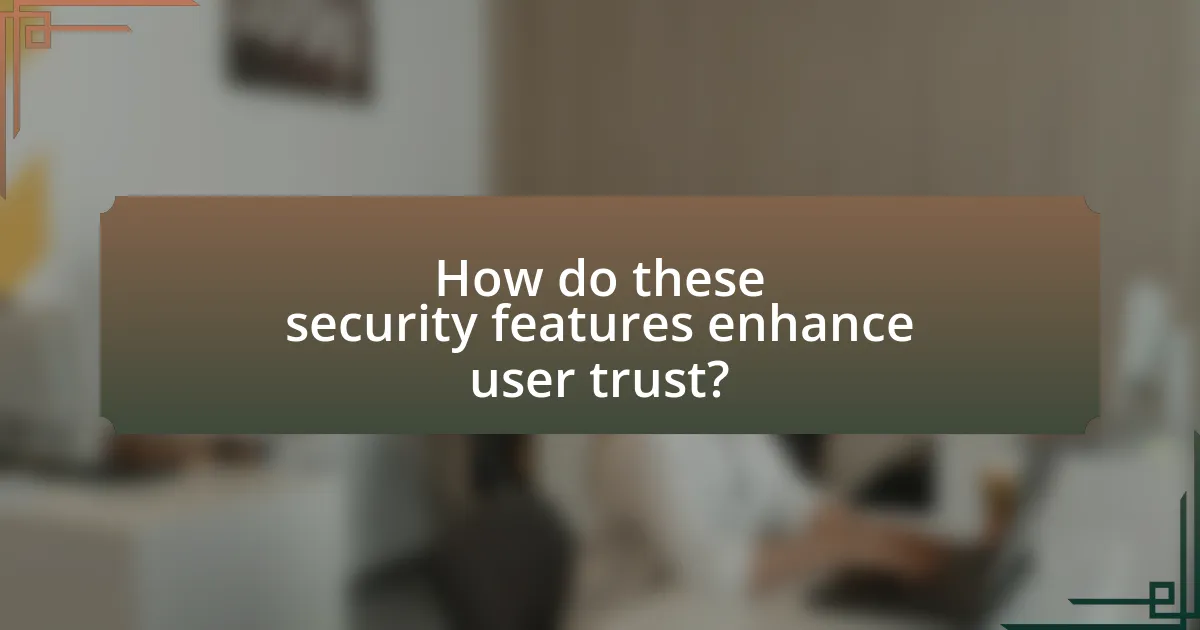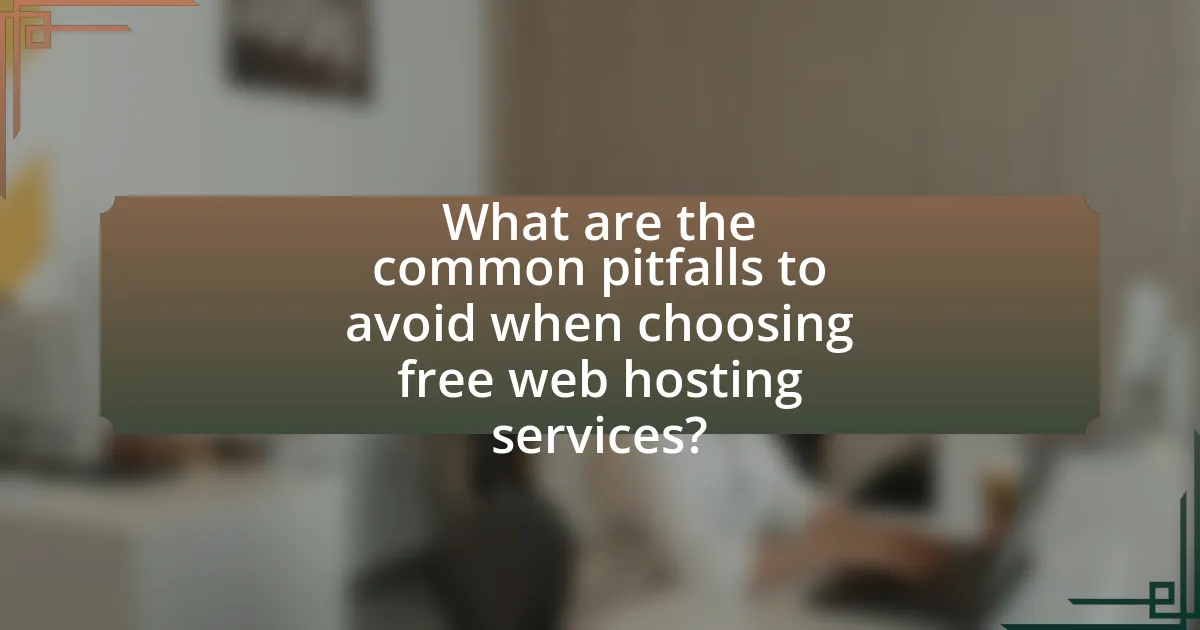The article focuses on the top five security features essential for free web hosting services: SSL certificates, regular backups, malware scanning, DDoS protection, and secure access controls. It emphasizes the importance of these features in safeguarding user data and maintaining website integrity, particularly given the vulnerabilities associated with free hosting platforms. The discussion includes the risks of inadequate security, the role of each feature in mitigating these risks, and best practices for enhancing website security. Additionally, it highlights the impact of security measures on user trust and experience, providing guidance on evaluating the security reputation of hosting services.

What are the Top 5 Security Features to Look for in Free Web Hosting Services?
The top five security features to look for in free web hosting services are SSL certificates, regular backups, malware scanning, DDoS protection, and secure access controls. SSL certificates encrypt data transmitted between the user and the server, ensuring secure connections. Regular backups protect website data from loss due to attacks or failures, allowing for quick recovery. Malware scanning detects and removes malicious software, safeguarding the website’s integrity. DDoS protection mitigates distributed denial-of-service attacks, maintaining website availability. Secure access controls, such as two-factor authentication, restrict unauthorized access, enhancing overall security. These features collectively contribute to a robust security posture for free web hosting services.
Why is security important in free web hosting services?
Security is crucial in free web hosting services because these platforms often lack robust protective measures, making them vulnerable to cyber threats. The absence of adequate security can lead to data breaches, loss of sensitive information, and unauthorized access to websites. According to a 2021 report by Cybersecurity Ventures, cybercrime is projected to cost the world $10.5 trillion annually by 2025, highlighting the increasing risks associated with inadequate security. Therefore, ensuring strong security features in free web hosting services is essential to safeguard user data and maintain website integrity.
What risks are associated with using free web hosting services?
Using free web hosting services poses several risks, including limited security, lack of customer support, and potential data loss. Limited security often results from inadequate protection against cyber threats, as free services may not implement robust security measures like encryption or firewalls. The absence of reliable customer support can lead to prolonged downtime or unresolved technical issues, impacting website accessibility. Additionally, free hosting providers may impose restrictions on data storage and bandwidth, increasing the risk of data loss or service interruption. These factors collectively compromise the reliability and safety of websites hosted on free platforms.
How can security features mitigate these risks?
Security features can mitigate risks in free web hosting services by implementing measures such as encryption, firewalls, and regular security updates. Encryption protects sensitive data during transmission, making it difficult for unauthorized users to access information. Firewalls act as barriers between trusted internal networks and untrusted external networks, preventing malicious attacks. Regular security updates ensure that vulnerabilities are patched promptly, reducing the likelihood of exploitation. According to a study by the Ponemon Institute, organizations that implement robust security measures can reduce the risk of data breaches by up to 50%.
What are the essential security features to consider?
The essential security features to consider in free web hosting services include SSL certificates, regular backups, malware scanning, firewalls, and DDoS protection. SSL certificates encrypt data transmitted between the user and the server, ensuring secure connections. Regular backups protect against data loss, allowing for recovery in case of incidents. Malware scanning detects and removes harmful software, maintaining site integrity. Firewalls act as barriers against unauthorized access, while DDoS protection mitigates attacks that can overwhelm server resources. These features collectively enhance the security posture of web hosting services, safeguarding user data and maintaining service availability.
What is SSL encryption and why is it crucial?
SSL encryption is a security protocol that establishes an encrypted link between a web server and a browser, ensuring that all data transmitted remains private and secure. This encryption is crucial because it protects sensitive information, such as personal details and payment data, from interception by malicious actors during transmission. According to a 2021 report by Google, websites using SSL encryption are significantly less likely to be compromised, highlighting its importance in maintaining user trust and safeguarding data integrity.
How does a firewall protect your website?
A firewall protects your website by monitoring and controlling incoming and outgoing network traffic based on predetermined security rules. It acts as a barrier between your website and potential threats, such as hackers and malware, by filtering out malicious traffic and allowing only legitimate requests. For instance, according to a report by Cybersecurity Ventures, cybercrime is projected to cost the world $10.5 trillion annually by 2025, highlighting the importance of firewalls in preventing unauthorized access and data breaches.
What role does malware scanning play in web hosting security?
Malware scanning is essential in web hosting security as it detects and removes malicious software that can compromise websites. By regularly scanning for malware, hosting providers can identify vulnerabilities and prevent attacks that may lead to data breaches or service disruptions. According to a report by Cybersecurity Ventures, cybercrime damages are projected to reach $10.5 trillion annually by 2025, highlighting the critical need for proactive measures like malware scanning to safeguard web environments.
Why is regular software updates important for security?
Regular software updates are crucial for security because they patch vulnerabilities that could be exploited by attackers. Software developers frequently identify security flaws and release updates to fix these issues, thereby reducing the risk of unauthorized access and data breaches. For instance, according to a report by the Cybersecurity & Infrastructure Security Agency, 85% of successful cyberattacks exploit known vulnerabilities for which patches are available. Therefore, consistently applying updates helps maintain a secure environment and protects sensitive information from potential threats.
How does data backup contribute to website security?
Data backup significantly enhances website security by ensuring that critical data can be restored in the event of a cyber attack, data corruption, or accidental deletion. Regular backups create copies of website data, which can be quickly accessed and restored, minimizing downtime and data loss. According to a study by the Ponemon Institute, 70% of organizations that experience a data loss incident without a backup go out of business within a year. This statistic underscores the importance of having a reliable backup system as a fundamental security measure for websites.

How do these security features enhance user trust?
Security features enhance user trust by providing assurance that their data is protected from unauthorized access and breaches. When web hosting services implement strong security measures such as SSL certificates, firewalls, and regular backups, users feel more confident that their information is safe. For instance, a study by the Ponemon Institute found that 70% of consumers are more likely to trust a company that demonstrates a commitment to data security. This trust is crucial for user retention and can significantly impact a service’s reputation in a competitive market.
What impact do security features have on user experience?
Security features significantly enhance user experience by providing a sense of safety and trust. When users perceive that their data is protected through measures such as encryption, secure sockets layer (SSL) certificates, and regular security updates, they are more likely to engage with the service. Research indicates that 85% of users abandon a purchase if they feel their data is not secure, highlighting the direct correlation between security features and user retention. Furthermore, platforms that prioritize security often experience lower rates of fraud and data breaches, which contributes to a more reliable and enjoyable user experience.
How can SSL certificates improve user confidence?
SSL certificates improve user confidence by ensuring secure, encrypted connections between users and websites. This encryption protects sensitive information, such as personal data and payment details, from interception by malicious actors. According to a study by GlobalSign, 84% of consumers would abandon a purchase if they knew their data was not secure, highlighting the importance of SSL in fostering trust. Furthermore, websites with SSL certificates display visual indicators, such as a padlock icon in the browser, which reassures users that their connection is secure. This visible security measure significantly enhances user trust and encourages engagement with the website.
What are the consequences of poor security on user trust?
Poor security significantly undermines user trust, leading to decreased user engagement and potential loss of customers. When users perceive that their data is at risk due to inadequate security measures, they are less likely to share personal information or conduct transactions on the platform. For instance, a study by the Ponemon Institute found that 70% of consumers would stop using a service after a data breach. This illustrates that poor security not only damages the immediate relationship between the user and the service provider but can also have long-term repercussions on brand reputation and customer loyalty.
How can you evaluate the security of free web hosting services?
To evaluate the security of free web hosting services, assess their encryption protocols, data backup policies, and user reviews regarding security incidents. Encryption protocols, such as SSL/TLS, ensure data transmitted between users and the server is secure. Data backup policies are crucial; reliable services should offer regular backups to prevent data loss. User reviews can provide insights into the service’s history of security breaches or vulnerabilities. For instance, a study by the Cybersecurity & Infrastructure Security Agency highlights that services with robust encryption and consistent backup practices significantly reduce the risk of data breaches.
What questions should you ask potential web hosting providers?
When evaluating potential web hosting providers, ask about their security features, including data encryption methods, firewall protection, and DDoS mitigation strategies. Inquire whether they offer regular backups and how they handle security breaches. Additionally, confirm if they provide SSL certificates and what their policies are regarding data privacy and compliance with regulations like GDPR. These questions ensure that the provider prioritizes security, which is crucial for protecting your website and user data.
How can you research the security reputation of a hosting service?
To research the security reputation of a hosting service, examine independent reviews, security certifications, and incident history. Independent reviews from reputable tech websites and user feedback on forums provide insights into the hosting service’s reliability and security practices. Security certifications, such as ISO 27001 or PCI DSS, indicate adherence to industry standards for data protection. Additionally, reviewing the hosting service’s incident history, including past security breaches or vulnerabilities, can reveal their track record in managing security risks. For example, a hosting service with multiple reported breaches may indicate a lack of robust security measures.

What are the common pitfalls to avoid when choosing free web hosting services?
Common pitfalls to avoid when choosing free web hosting services include lack of security features, limited bandwidth, and poor customer support. Many free hosting providers do not offer essential security measures such as SSL certificates or regular backups, which can leave websites vulnerable to attacks. Additionally, free services often impose bandwidth limits that can lead to slow loading times or downtime during high traffic periods. Furthermore, inadequate customer support can hinder problem resolution, as many free hosts offer minimal assistance. These factors can significantly impact website performance and security, making it crucial to carefully evaluate free hosting options.
What security compromises might free hosting services make?
Free hosting services often compromise security by providing limited data encryption, which exposes user data to potential breaches. These services may also lack robust firewalls and intrusion detection systems, making them vulnerable to attacks. Additionally, free hosting platforms frequently monetize through ads or data selling, which can lead to privacy violations. A study by the University of Maryland found that 70% of free hosting services do not implement adequate security measures, further highlighting the risks associated with using such platforms.
How can limited resources affect security measures?
Limited resources can significantly compromise security measures by restricting the implementation of essential protective technologies and personnel. When organizations operate with constrained budgets, they often prioritize basic functionalities over advanced security features, leading to vulnerabilities. For instance, a study by the Ponemon Institute found that 60% of organizations with limited budgets reported inadequate security measures, increasing their risk of data breaches. Consequently, insufficient funding can result in outdated software, lack of regular security updates, and minimal staff training, all of which heighten the likelihood of cyberattacks.
What should you be wary of in terms of data privacy?
You should be wary of data breaches and unauthorized access to personal information in terms of data privacy. Data breaches can expose sensitive information, leading to identity theft and financial loss. According to a report by IBM, the average cost of a data breach in 2021 was $4.24 million, highlighting the significant risks associated with inadequate data protection measures. Additionally, free web hosting services may lack robust security protocols, making them more vulnerable to attacks. Therefore, it is crucial to assess the security features of any web hosting service to ensure data privacy is adequately protected.
What best practices can enhance your website’s security on free hosting?
To enhance your website’s security on free hosting, implement strong password policies and enable two-factor authentication. Strong passwords reduce the risk of unauthorized access, while two-factor authentication adds an extra layer of security by requiring a second form of verification. Additionally, regularly update your website’s software and plugins to patch vulnerabilities, as outdated systems are prime targets for attacks. Utilize HTTPS to encrypt data transmitted between the user and the server, protecting sensitive information from interception. Lastly, regularly back up your website data to ensure recovery in case of a security breach or data loss. These practices collectively strengthen your website’s defenses against potential threats.
How can you implement additional security measures yourself?
To implement additional security measures yourself, you can utilize strong passwords, enable two-factor authentication, regularly update software, and conduct regular security audits. Strong passwords reduce the risk of unauthorized access, while two-factor authentication adds an extra layer of protection by requiring a second form of verification. Regular software updates patch vulnerabilities, and conducting security audits helps identify potential weaknesses in your system. According to a study by Verizon, 81% of data breaches are linked to weak or stolen passwords, highlighting the importance of these measures.
What are the benefits of using a content delivery network (CDN) for security?
Using a content delivery network (CDN) enhances security by providing DDoS protection, secure token authentication, and improved data encryption. CDNs distribute traffic across multiple servers, which mitigates the impact of DDoS attacks by absorbing excess traffic and preventing server overload. Additionally, CDNs often implement secure token authentication, ensuring that only authorized users can access content, thus reducing the risk of unauthorized access. Furthermore, CDNs utilize HTTPS and other encryption methods to protect data in transit, safeguarding sensitive information from interception. These features collectively strengthen the overall security posture of websites utilizing CDN services.
